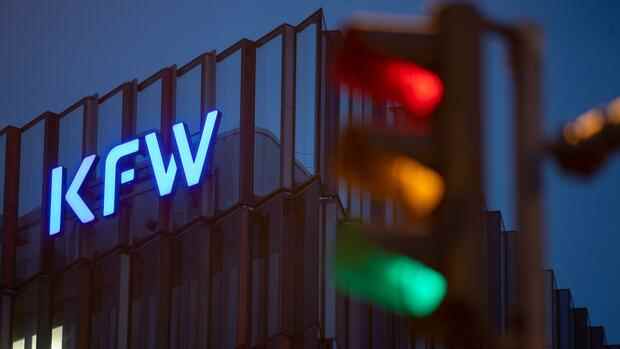Instead of a decline, KfW is now assuming growth in the credit market.
(Photo: dpa)
Frankfurt The state development bank KfW is assuming a trend reversal in new corporate loans: “The low point on the credit market is behind us. In the final quarter, credit growth could turn positive, ”said KfW’s chief economist, Fritzi Köhler-Geib, to the Handelsblatt. So far, KfW assumed a slight decline of two percent in new business before the turn of the year.
For the fourth quarter, KfW is now assuming growth in new business of around one percent, as will the first quarter of the new year. That is a clear improvement compared to the third quarter, in which new business shrank by 7.6 percent, and even more so in relation to the second quarter with a minus of 12.7 percent.
In the third quarter, the share of companies in loan negotiations with banks of all sizes had reached a new low since the survey began: According to KfW, only 17.7 percent of all medium-sized companies said they had requested a bank loan.
That should change now. A large part of the now expected improvement is only due to the elimination of a negative base effect: Since the fourth quarter of 2020, new business has been shrinking after the large wave of financing at the beginning of the corona pandemic – partly because many companies were saturated with liquidity, partly because they were due to the economic Uncertainty had postponed investments.
Top jobs of the day
Find the best jobs now and
be notified by email.
In addition to this statistical effect, Köhler-Geib believes that something else has another effect: She assumes that companies’ external financing requirements will increase “a little more” than expected. According to her, the persistent delivery bottlenecks contribute to this. “They make primary products and investment projects more expensive. This increases the need for funds, ”said the chief economist.
Conditions for a stronger credit market are given
From the development bank’s point of view, the prerequisites for more vigorous investment activity and lending are in place for 2022 “in principle, primarily because of the good order situation in the industry and ongoing favorable financing conditions”. In addition, companies are likely to make up at least some of the investments that have been postponed due to the corona pandemic.
Growing demand for credit would be good news for banks, as more loans granted would increase interest income, which is particularly important for German institutions. According to the Bank Lending Survey, a Bundesbank survey on the lending business, corporate interest in new loans also fell short of banks’ expectations.
However, the financial institutions were also very risk-conscious: The Bundesbank reports that the rejection rates remained “at a comparatively high level” in the third quarter. The banks surveyed also tightened their credit guidelines slightly because they rated the credit risk as higher.
For the current quarter, the banks are planning on balance slight loosening of their credit guidelines and are assuming a slight increase in demand for loans. This fundamentally optimistic assessment had also been shared by some corporate bankers in recent weeks.
New corona variant influences prognosis
However, these assessments come from a time before the appearance of the omicron variant of the coronavirus. Since then, the Ifo Institute, among others, has lowered its forecast for German economic growth in 2022 by 1.4 percentage points to 3.7 percent due to Omikron in mid-December.
“The ongoing delivery bottlenecks and the fourth corona wave are noticeably slowing down the German economy. The strong recovery initially expected for 2022 will be postponed further ”, said Ifo economic chief Timo Wollmershäuser. In return, the economy is expected to grow 1.4 percentage points more strongly in 2023 than predicted in autumn and grow by a total of 2.9 percent.
The subdued economic outlook is likely to slow down the recovery in the lending business as well: With the appearance of this variant, the economic framework conditions will again be “significantly disrupted”, even according to KfW: The environment for investments is clouding over, the delivery bottlenecks could be prolonged, new restrictions to contain them the pandemic are likely.
“The Omikron variant of the corona virus is overshadowing the further recovery on the credit market,” Koehler-Geib therefore admits. This brings new uncertainty to the economy, especially with regard to the timing of the recovery. “At the moment, I don’t expect a sustained acceleration in credit growth until the second half of the year,” says the chief economist.
More: Lean spell for banks – companies hesitate when it comes to loans

